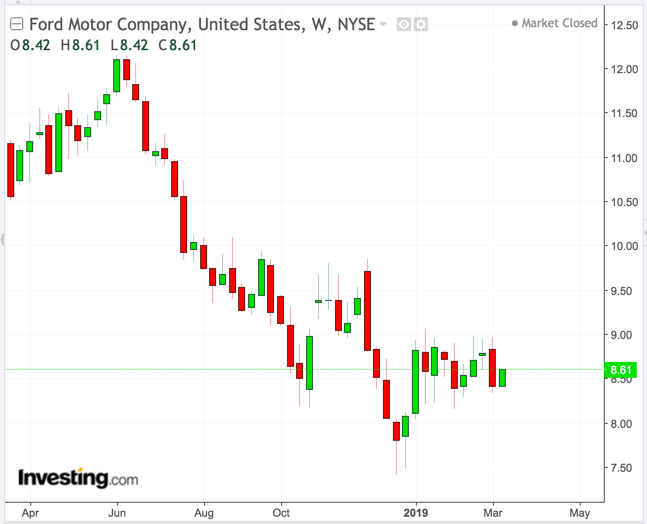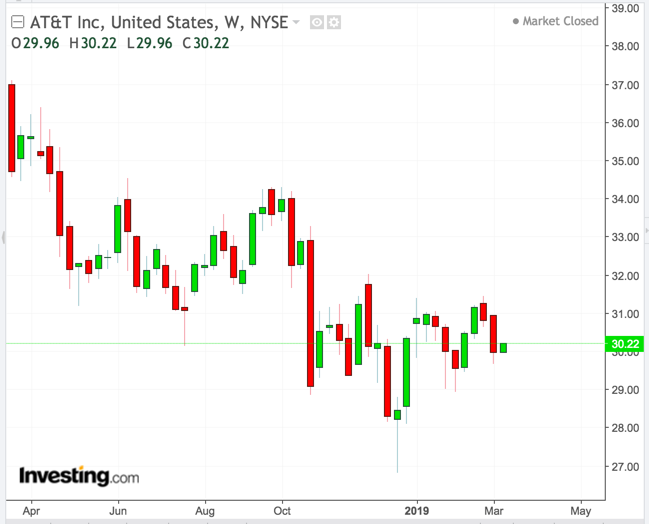Stocks offering high-yielding dividends can sometimes be a double-edged sword. Companies facing drastic cash-flow problems, demand slowdown, or ballooning debt, could see investor confidence drain away fast. Such a toxic mix of problems risks leading to share prices tanking, inflating dividend yields.
Two iconic American brands — Ford Motor Company (NYSE:F) and AT&T Inc. (NYSE:T) — are facing this kind of situation. For the past several years, their share prices have been on a slippery-slope, while their dividend yields have soared. Both stocks are offering close to 7% forward yield — a highly attractive rate of return at a time when Treasury yields have fallen, improving their income appeal.
Taking a deeper look at the problems they're facing will help us understand whether their inflated yields offer an opportunity or a threat that income investors should avoid.
Ford: Tough Balancing Act
After years of rising sales, the world’s second-largest automaker is seeing demand for its cars slowing down, led by China and Europe.
For the fiscal year that ended in December, Ford reported earnings before interest and taxes had fallen about 27%. Beyond the cyclical factors, the carmaker is also facing pressures from more structural changes that are taking place in the auto industry, where consumer preferences are changing and a big disruption from electric and autonomous car producers — such as Tesla (NASDAQ:TSLA) and Google's (NASDAQ:GOOG) Waymo — is just round the corner.
To deal with these challenges, last year Ford announced a company-wide $11 billion restructuring plan, spread over five years, which includes major job cuts, weeding out slow-selling variants of particular models, and potentially closing entire factories in Europe.

But these moves have failed to win over investors who believe the company is moving too slowly to cope with the challenges that require a more proactive approach. That mistrust has caused Ford’s shares to lose more than 20% of their value in the past year, falling from $10.81 a year ago to $8.61 at yesterday's close, and pushing its dividend yield up to 7.13%. It's also raising doubts about the company’s $0.15-a-share quarterly dividend — currently the most generous among its automotive peers.
AT&T: Victim of Debt-Fueled Growth
Telecom utilities are generally considered a safe long-term bet for income investors, given their reliable cash flows that continue to pour in as long as phone bills are paid.
AT&T, the U.S.'s largest telecom operator, is a dividend stock that has delivered uninterrupted payout hikes for the past 35 years. But despite this remarkable history, investors are becoming skeptical about the company’s future prospects after the company acquired Time Warner’s assets in last June for $85 billion.
AT&T went into this massive undertaking to turn itself into a modern media company that's better able to compete with disruptors, such as Netflix (NASDAQ:NFLX), through its superior content. The acquisition was intended to revive growth amid accelerating cord-cutting at its cable division. More than 400,000 subscribers quit AT&T’s DirecTV satellite service in the fourth quarter of 2018, taking the total loss for the past fiscal year to a whopping 1.24 million.
But the market didn’t like AT&T’s growth initiative, which came accompanied by a lot of debt. After the Time Warner deal, the telecom giant's debt swelled from $126 billion at the end of 2017 to $171 billion at the end of 2018.

Its stock has fallen about 20% during the past 12 months, from $37.36 a year ago to $30.22 at yesterday's close. This has increased its forward annual dividend yield to 6.81%, and is raising concerns about its $0.51-a-share quarterly dividend.
Which Stock Is a Safer Bet?
It’s hard to see growth returning to these companies anytime soon. Both auto and telecom industries are going through major changes which will continue to put pressure on their earnings, free cash flows and their share prices.
That said, growth isn’t the reason one should invest in these stocks. Investors in AT&T and Ford can take a long-term approach and buy these stocks to earn regular income. With this goal in mind, AT&T stock offers a better value with its long track-record of paying dividends and its reasonable payout ratio of 75.69 as a percentage of free cash flow.
Ford, on the other hand, isn’t as reliable as AT&T when it comes to its dividend. Ford last slashed its payout in July 2006, then suspended it two months later amid collapsing sales. The company resurrected the dividend in 2012 after it emerged as the only Detroit automaker to make it through the global recession without resorting to a government-backed bankruptcy.
AT&T’s restructuring could prove a long and painful process, but its 6.81% yield is a better bet than Ford’s.
